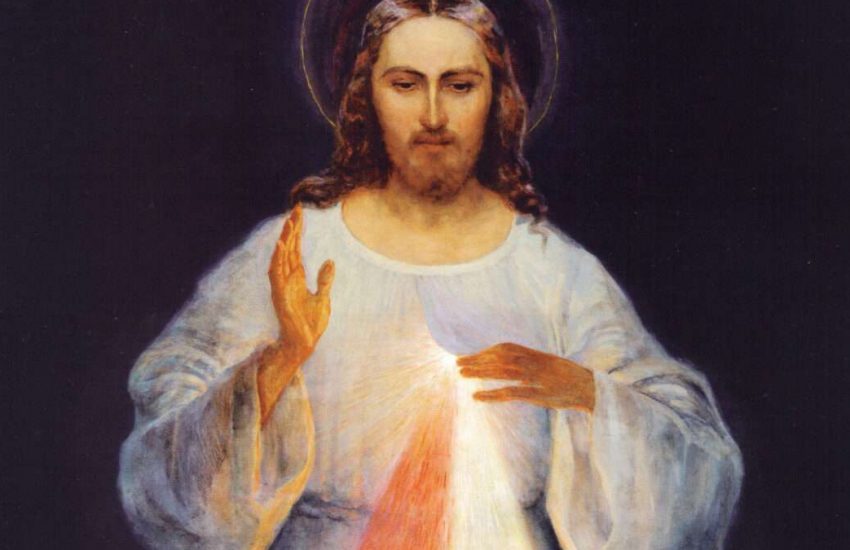Gospel For Today: 3rd Sunday of Easter
THIRD SUNDAY OF EASTER (B)

“Thus it is written that the Christ would suffer and rise from the dead on the third day and that repentance, for the forgiveness of sins, would be preached in his name to all the nations, beginning from Jerusalem. You are witnesses of these things.”
This is the conclusion of our gospel reading for today, from Luke 24:35-48. This, followed by His promise to send the Holy Spirit, are the last words Luke records Jesus saying to the disciples before His Ascension. This is the meaning of Easter. This is what it has all been for. Why did Christ have to suffer and die, and then rise from the dead? Jesus gives us the answer: so that repentance, for the forgiveness of sins, would be preached in His name.
And not only preached, but actuated. We saw last week how Jesus breathed the Holy Spirit into the Apostles saying, “Whose sins you forgive are forgiven, whose sins you retain are retained” (Jn 20:23). Thus the authority to convey Christ’s forgiveness to those who repent and confess their sins is given to the Church. But how are people to know to confess their sins? How are we brought to repentance? We need to be told and instructed, so Jesus commands His followers to witness to these things, to go tell the world. We have examples today of two Apostles, Peter and John, doing just that. Peter, in the first reading from Acts preaches about how the death and resurrection of the Christ was foretold in the scriptures, and ends his homily with the command to “repent, therefore, and be converted, that your sins may be wiped away” (Acts 3:17-19).
Some today wish to believe that Jesus’ death and resurrection means automatic forgiveness of sins for everyone, with nothing left to do on our part. Hell, in this view, is an empty place (if it even exists at all). All are saved by Christ, no exceptions. Still more, though they may not profess universal salvation, conduct their lives as if it were true. “Jesus died for me and there is nothing else I need to do.” And so they don’t go to Confession, to Mass, read the scriptures, pray, attempt to avoid sin, or make any effort to know God at all.
Those who believe this way are partly correct. Jesus did die for all. And there is nothing you or I can do to save ourselves. We must rely totally on Christ if we are to be redeemed. The work is His, not ours. But the Catholic Church does not teach universal salvation. The reason is summed up in a statement by St. Augustine: “God created us without us: but He did not will to save us without us.” This line from one of his sermons is quoted in the Catechism of the Catholic Church, which then immediately reminds us, “To receive His mercy, we must admit our faults” (CCC 1847).
We cannot forget that God is love. We may think the most loving thing to do would be to universally save all mankind and make it impossible for anyone to go to Hell. But that is not what love is. Love does not force anyone into a relationship. Love beckons and invites. Love desires to be freely loved back. Love wants to be in relationship with the beloved. Heaven is nothing more than eternal union with God. Hell is nothing less than eternal separation from God. Our eternal destiny is determined by our relationship with the Creator. Do we choose to be in relationship with Him or not? That choice is made by us and by our actions in this life.
Our relationship with God is broken by sin, which originates in the human heart. Our relationship with God is healed by forgiveness, which originates in the Sacred Heart of Jesus. This is why St. Peter tells us in today’s first reading to “repent” and “be converted.” To repent means to turn around, to change our minds. We have to change our minds about our sins, turn away from them and back toward God. To be converted literally means to be transformed. When we repent from our sins and accept God’s gift of forgiveness we are transformed into a new creation — we become the person God made us to be. But we do not transform ourselves. We are converted by God, which can only happen when we turn away from sin and turn toward God. Thinking we can transform ourselves into holy people is prideful. Pride is the primordial sin, which is why humility is such an important aspect of growing in holiness.
John also gives witness to the need to repent and accept Jesus’ forgiveness of sins in his letter from today’s second reading (1 Jn 2:1-5a). He writes of the importance of not only believing in God, but in living our lives in accordance with His will. “The way we may be sure that we know Him is to keep His commandments,” he writes. “Those who say, ‘I know Him,’ but do not keep His commandments are liars and the truth is not in them.”
While stressing the importance of keeping the commandments, John does not condemn those who fall into sin. “My children,” he writes, “I am writing this to you so that you may not commit sin. But if anyone does sin, we have an Advocate with the Father, Jesus Christ the righteous one.” Our sins separate us from God; Jesus offers us reconciliation.
Both Peter and John give us the continuation of the Easter message. This is what Easter was for. This is what you should do about it. Repent and be converted.
Practically speaking, what does this mean?
- Become aware of your sins. Most likely, you know the “biggies” that are weighing on your conscience. Study the moral teachings of the Church to help you identify other areas of your life that are at odds with the love of God. Firmly resolve, with Jesus’ help, to avoid those sins in the future.
- Return to the sacraments. If you have been away from Mass and/or Confession for a while, the best time to return is today. Right now. If you don’t know what to do, just tell the priest you want to confess but you are not sure how. He’ll gladly walk you through it and rejoice with you in your forgiveness.
- Don’t dwell on your sins! You’ve repented and been forgiven, so don’t give your past sins any more power over you by dwelling on them. You are not that sinful person any longer, you are a new creation.
- Build a relationship with God. That’s why Jesus died for you, and why you repented from your sins — to restore your relationship with God. Start working on that relationship today. Pray. Every day. It doesn’t have to be long or complex. Just a few minutes each day to lift your mind and heart to God. You just have to do it. Get to know Him more by reading His Word. One easy way to start is by following this link to today’s readings on the USCCB web site. At the bottom of the page you can subscribe to start receiving the daily Mass readings in your email each day. Spend time getting to know the scriptures.
- Finally, and most importantly, allow God to do His work in your life. He wants to change you for the better, but change can be difficult. Sometimes it can hurt. Our human instinct is all too often to fight against it. Don’t do this! Satan wants you to stay as you are, but God wants you to be so much more. He’s willing to do the heavy lifting to transform you into a saint, but you have to let Him do it. Giving yourself over to God’s will can be frightening, but remember that everything God wants to do for you is good. There is no need to be afraid. Give God permission to work in your life.
Christ is Risen! Turn away from your sins. Turn towards the Risen Christ, and be transformed!
—

WCU Catholic Campus Ministry
Matthew Newsome, MTh, campus minister
(828)293-9374 | POB 2766, Cullowhee NC 28723



